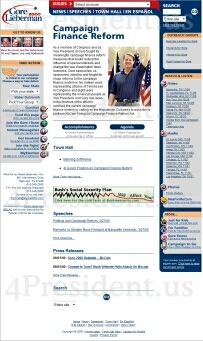|

Al Gore
2000 On The Issues
CAMPAIGN FINANCE
"Together, we can end the money chase, and create a system where we pursue our highest ideals." - Al Gore
Many Americans know that our campaign finance system is broken and needs to be fixed. The laws that govern campaigns, created over a generation ago, have been overtaken by rising costs and new technologies. In the 1970s, as a Congressman, Al Gore was an early sponsor of legislation to limit spending for Congressional campaigns and provide public financing of elections. He sponsored or cosponsored numerous campaign finance reform proposals during his service in Congress. In 1988, then-Senator Gore drafted and introduced legislation requiring that broadcasters give candidates free television time as a condition of their licenses. As President, Al Gore would fight to provide real and comprehensive campaign finance reform, create fairer and more open elections, break the link between special interests and political influence, and give democracy back to the American people. His first legislative proposal to Congress would be the McCain-Feingold campaign finance reform bill. He would follow that crucial first step with additional measures to completely reform the way in which campaigns are financed.
STEP ONE: INITIAL REFORMS
- Ban Soft Money: Al Gore believes the first step to reduce the influence of money in our elections is to ban "soft money" contributions. He will fight to pass the bipartisan campaign finance reform legislation championed by Senators John McCain (R-AZ) and Russ Feingold (D-WI) and Representatives Christopher Shays (R-CT) and Marty Meehan (D-MA). If elected President, he will make this legislation the first bill he submits to Congress.
- Enact New Lobbying Reform: To break the link between money and political influence, Gore would propose two important reforms of the laws governing lobbyists' activities. First, he would propose legislation requiring Washington lobbyists to publicly disclose information on all of their activities - such as the names of officials to whom lobbyists have contributed and the specific meetings they have attended to discuss legislation. Second, he would challenge the Congress to post this information every month on the Internet, so that all Americans could see information on those trying to influence their representatives.
- Strengthen the Federal Elections Commission (FEC): Al Gore would strengthen the FEC by devoting more resources to this body, strengthening its powers of investigation and enforcement.
- Improve Disclosure of Issue Advocacy Advertisements: Al Gore supports measures to require that all issue advertisements by special interest groups broadcast within 60 days of an election disclose their sources of funding.
- Provide Candidates Targeted in Issue Advertisements with Equal Air Time: Al Gore will request the Federal Communications Commission (FCC) to require broadcasters to provide candidates in campaigns targeted by issue advocacy advertisements with an equal amount of free broadcast time.
- Support Television Time for Democracy: Al Gore strongly endorses the proposal championed by reform advocate Paul Taylor to encourage broadcasters to agree to a voluntary standard of free broadcast time. That standard calls on broadcasters to offer five minutes a night of candidate-centered discourse in the thirty nights preceding an election.
STEP TWO: THE DEMOCRACY ENDOWMENT
- In order to encourage all Americans to participate, Al Gore would propose a 100 percent tax deduction for any individual or corporation that makes contributions to the Democracy Endowment. The tax deduction would expire after seven years or at the time the Endowment reaches its funding goal, whichever comes first. The total cost of this proposal to the Treasury, during the time taken to fully fund the Endowment, would be $2.13 billion. If the full seven years were required to meet the Endowment's funding goal, the average annual cost to the Treasury would be $304 million.
- In order to fund Congressional campaigns at a reasonable rate, this fund would have to contain $7.1 billion at the end of the seven-year period. If fundraising for the Endowment fell short at the end of the period for which the tax deduction is in place, broadcasters -- under the terms of the authorizing legislation -- would be required to provide an amount of free television and radio time (measured in rating points) to candidates in order to make up for the shortfall.
Source: Al Gore for
President 2000 Web Site
|
|